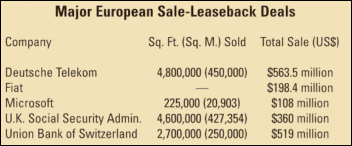 From Site Selection magazine, May 2001
WORLD REPORTS: EUROPE
|

Euro Firms Offloading Property
To Focus Funds on Core Business
s globalization accelerates, obliging firms to maximize operational flexibility, the U.S.-led sale-and-lease-back craze is spreading to Europe. Firms are rushing to minimize commitment to fixed assets and re-engineer corporate real estate portfolios to generate more funds for their core business.
 Says Denis Kavanagh, international director corporate finance Jones Lang LaSalle, an adviser on a growing number of sale-leaseback deals: "The market is bashing firms with too much owned real estate assets that dilute return on capital. Companies are looking to maximize capital receipts from their assets at an acceptable lease/cost structure and minimize the impact on both the balance sheet and earnings per share. Essentially, corporate owners are trying to realize their assets without increasing the liabilities. And raising capital from unloading real estate takes the pressure off credit ratings." The numbers highlight the European difference with the U.S., where "owning the store" is not a priority. According to Jones Lang LaSalle estimates, Europe's US$3.1 trillion worth of commercial real estate is 70 percent owned, while in the United States the larger commercial real estate market of $3.7 trillion is only 30 percent owned by occupiers. The Proof Is in the Pudding In continental Europe's largest sale-leaseback deal to date, Union Bank of Switzerland (UBS) in late 1999 sold off 2.7 million sq. ft. (250,000 sq. m.) of space spreading through 84 properties for CHF875 million to a European consortium. UBS then leased back most of it for a $35.9 million yearly initial rent bill that will rise by only 80 percent of the Swiss consumer price index, and the 15-year leases have five- and 10-year breakout clauses that allow the bank to shrink or expand its space. UBS can also sublet and has the option to shift technical management of the properties to the owner after the initial five years.In Italy, Fiat sold nine of its Turin office buildings in November 1998 to a special purpose vehicle SPV firm for $198.4 million and retained use of the buildings through structured, long-term leases. In Germany, the country's telecommunications giant Deutsche Telekom (DT) is also getting into the act. This year DeTeImmobilien, DT's fully owned property subsidiary, will sell 4.8 million sq. ft. (450,000 sq. m.) in 27 office properties that have an aggregate value of $563.5 million. DT will be able to lease back the facilities at an estimated initial yearly rent of $39 million with 15-year leases and an annual fixed-rent increases of 1.5 percent, allowing DT to predict occupancy costs. Five-year breakout clauses will allow flexibility in deploying its space. Says Kavanagh, "There are a bunch of structured sale-leaseback deals in the planning by U.S., British, German, Swedish, Belgian and Dutch firms that will have a significant impact across the continent since many involve pan-European assets." Sale-leasebacks and Flexibility Says Kavanagh: "With increasing transparency, companies have to actively manage their financial inventory including real estate. They also have to manage their exposure to market volatility and occupancy costs. A carefully managed leasehold portfolio can provide that needed flexibility."Paul Taylor CEO of Roitch Property Group Ltd. agrees: "We're moving into an era where the landlord and tenant are partners, not adversaries. Over a year ago, we acquired three buildings from a major bank for the market price and drew up a single 20-year lease for the facilities that allowed us to finance the deal. Increasingly you're going to see landlords and tenants, in Europe working together to get more value out of the property." As workplace reconfiguration gathers steam in Europe, Microsoft sold three office buildings (225,000 sq. ft./ 20,903 sq. m.) at Thames Valley Park, UK's Silicon Valley, for $108 million and signed a 12-year lease with predictable rental increases and early breakout clauses. 

| |
|
| |
 ©2001 Conway Data, Inc. All rights reserved. SiteNet data is from many sources and not warranted to be accurate or current. |